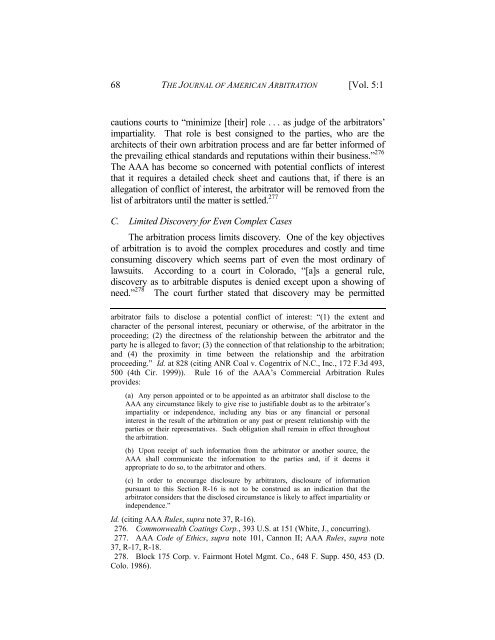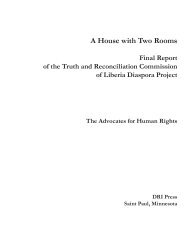2006/Vol. 5 No.1 - Hamline Law - Hamline University
2006/Vol. 5 No.1 - Hamline Law - Hamline University
2006/Vol. 5 No.1 - Hamline Law - Hamline University
Create successful ePaper yourself
Turn your PDF publications into a flip-book with our unique Google optimized e-Paper software.
68 THE JOURNAL OF AMERICAN ARBITRATION [<strong>Vol</strong>. 5:1<br />
cautions courts to “minimize [their] role . . . as judge of the arbitrators’<br />
impartiality. That role is best consigned to the parties, who are the<br />
architects of their own arbitration process and are far better informed of<br />
the prevailing ethical standards and reputations within their business.” 276<br />
The AAA has become so concerned with potential conflicts of interest<br />
that it requires a detailed check sheet and cautions that, if there is an<br />
allegation of conflict of interest, the arbitrator will be removed from the<br />
list of arbitrators until the matter is settled. 277<br />
C. Limited Discovery for Even Complex Cases<br />
The arbitration process limits discovery. One of the key objectives<br />
of arbitration is to avoid the complex procedures and costly and time<br />
consuming discovery which seems part of even the most ordinary of<br />
lawsuits. According to a court in Colorado, “[a]s a general rule,<br />
discovery as to arbitrable disputes is denied except upon a showing of<br />
need.” 278 The court further stated that discovery may be permitted<br />
arbitrator fails to disclose a potential conflict of interest: “(1) the extent and<br />
character of the personal interest, pecuniary or otherwise, of the arbitrator in the<br />
proceeding; (2) the directness of the relationship between the arbitrator and the<br />
party he is alleged to favor; (3) the connection of that relationship to the arbitration;<br />
and (4) the proximity in time between the relationship and the arbitration<br />
proceeding.” Id. at 828 (citing ANR Coal v. Cogentrix of N.C., Inc., 172 F.3d 493,<br />
500 (4th Cir. 1999)). Rule 16 of the AAA’s Commercial Arbitration Rules<br />
provides:<br />
(a) Any person appointed or to be appointed as an arbitrator shall disclose to the<br />
AAA any circumstance likely to give rise to justifiable doubt as to the arbitrator’s<br />
impartiality or independence, including any bias or any financial or personal<br />
interest in the result of the arbitration or any past or present relationship with the<br />
parties or their representatives. Such obligation shall remain in effect throughout<br />
the arbitration.<br />
(b) Upon receipt of such information from the arbitrator or another source, the<br />
AAA shall communicate the information to the parties and, if it deems it<br />
appropriate to do so, to the arbitrator and others.<br />
(c) In order to encourage disclosure by arbitrators, disclosure of information<br />
pursuant to this Section R-16 is not to be construed as an indication that the<br />
arbitrator considers that the disclosed circumstance is likely to affect impartiality or<br />
independence.”<br />
Id. (citing AAA Rules, supra note 37, R-16).<br />
276. Commonwealth Coatings Corp., 393 U.S. at 151 (White, J., concurring).<br />
277. AAA Code of Ethics, supra note 101, Cannon II; AAA Rules, supra note<br />
37, R-17, R-18.<br />
278. Block 175 Corp. v. Fairmont Hotel Mgmt. Co., 648 F. Supp. 450, 453 (D.<br />
Colo. 1986).
















